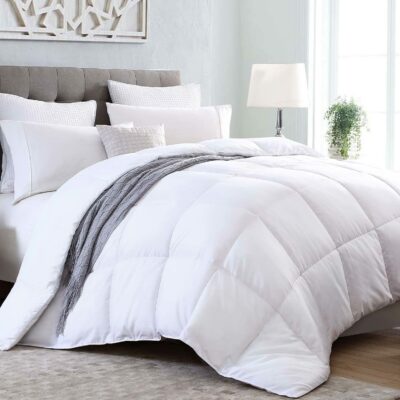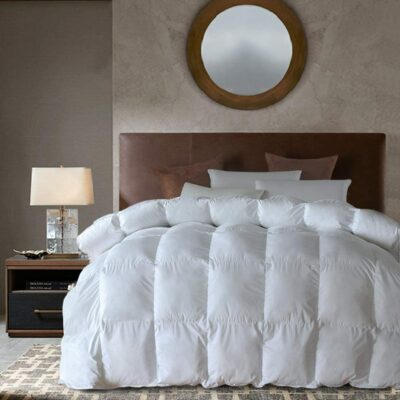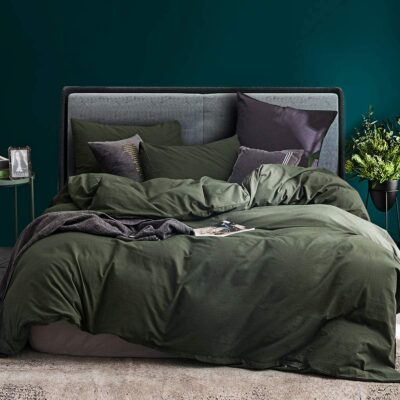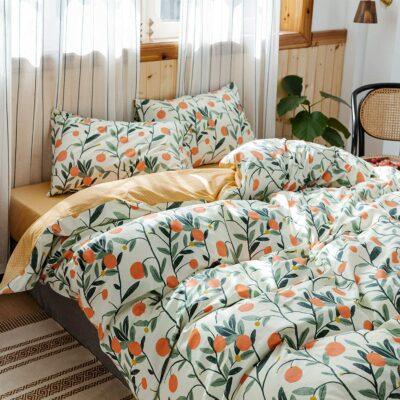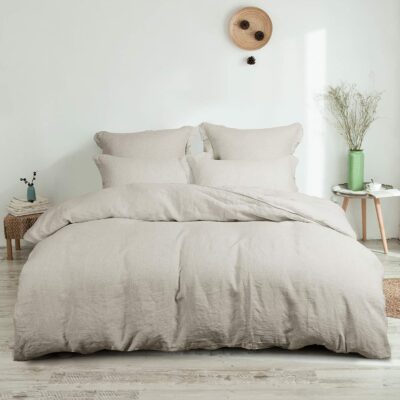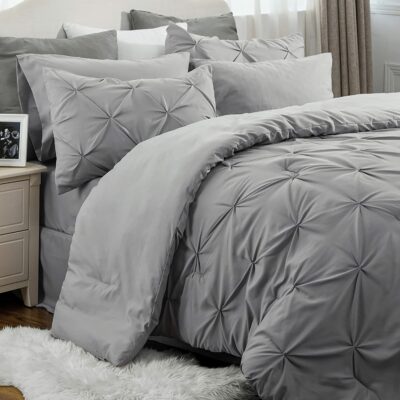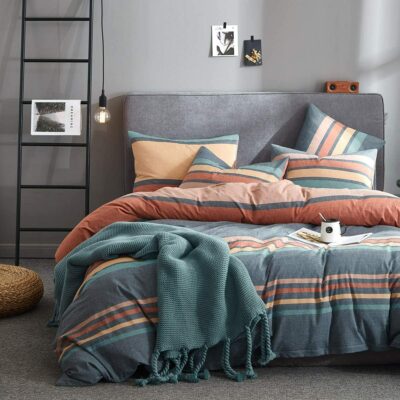Expert Certified: This piece was written and edited by Kayla Hein, an interior designer with over 10 years of professional design experience.
So you have a mattress and now it’s time to dress the bed. Pillows, sheets, and blankets—but what about the top? Duvet vs. comforter? Which is right for you? And they look so similar, what’s the real difference here?
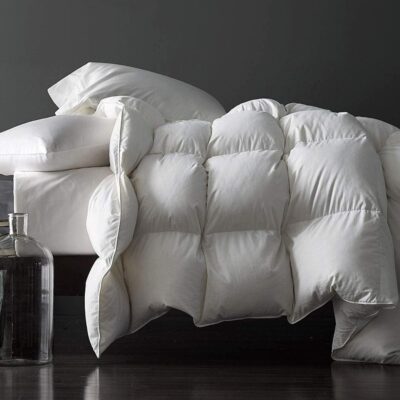
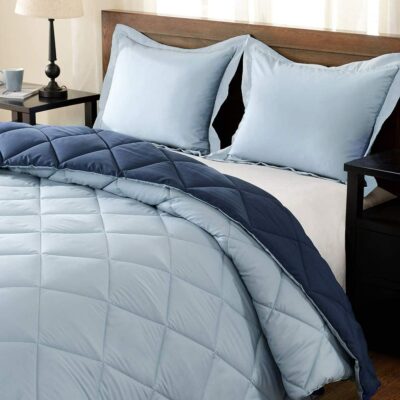
Duvet
Pros
- Easier to wash and dry and can fit in standard washer / dryer
- Interchanging cover allows for more design flexibility
- Insert + cover sold separately
Cons
- Harder to assemble
- Cover may shift from the insert
Comforter
Pros
- One piece, so the insert doesn’t shift around as it may on a duvet
- Often sold in a set with matching pillows
- Typically less expensive
Cons
- Harder to fit larger sizes in a standard washer / dryer
Summary
Duvet vs. comforter — A duvet cover is a 2-piece set (cover and insert), while a comforter is a single piece where the fill is typically quilted within a single cover.
With a duvet, you typically take the cover off and wash only the cover, not the insert. Whereas with a comforter, you wash the whole thing since it’s a single piece.
In This Guide
The Differences | What is a duvet? | What is a comforter? | Which is Right For Me? | FAQ
Duvet vs. Comforter: What are the differences?
The main differences between a comforter and a duvet basically pare down to the following.
- Maintenance: Duvets are generally easier to maintain because the cover can be removed from the insert for washing and drying. Many comforters are too large for standard washers and dryers, which can cause a problem when it’s time to clean.
- Assembly: Putting a duvet set together is more maintenance because you are dealing with two pieces and it can be tricky to get the corners aligned just perfectly on the duvet insert and cover. Think of it like putting a mattress-sized pillowcase on.
- Price: Duvets are oftentimes more expensive because there are two pieces instead of just one. For the most budget-friendly solution, you’re probably better off with the comforter. But for durable, flexible bedding solutions, the duvet is a great pick.
What is a duvet?
A duvet comes from the French word “duvet” meaning “down” or “down feathers”, which is the material commonly used.
Unlike a comforter which is a single piece, a duvet includes two piece: a cover and an insert.
The insert is stuffed with down and typically has square quilting to keep the down from shifting.
Best Duvet Inserts
The cover can be a variety of materials, but it is typically thin and has a color or pattern whereas duvet inserts are typically white (since they are not seen).
Best Duvet Covers
Duvets can be as cheap as $20-30 or as expensive as several hundred. When shopping for a duvet, here are a few tips to keep in mind.
#1. Corner Tabs
Quality duvet inserts have small loops on all four corners of the insert. And quality duvet covers have small ties or snaps that attach to those loops. This is an important design feature that keeps the duvet insert from sliding around or the cover from bunching up.
#2. Closure
There are a few different ways to close up a duvet cover including a zipper, ties, or buttons. Each closure is typically located at the foot of the bed and is pretty discreet.
The type of closure you prefer tends to be more of an aesthetic choice, but is something you may still want to consider.
Expert Tip: For faster assembly, opt for zippers over buttons or ties.
How to put on a duvet?
Putting a duvet cover on can be a little tricky. For the best results, follow the technique below.
You can also check out this quick video for how to put on a duvet cover.
- Step 1: Turn the duvet cover inside out.
- Step 2: Locate the top two corners of the duvet cover and duvet insert and attach the ties / corner tabs if available.
- Step 3: Flip it right-side out and shake the duvet until the cover reaches the bottom—kind of like putting a pillowcase on.
- Step 4: Zip, tie, or button the bottom of your duvet and smooth it out.
What is a comforter?
A comforter is a single piece that includes a cover and poly fill or batting quilted together as a single layer. Most comforters have a plush feel and are filled with poly fill, batting, or sometimes even down feathers like traditional duvets.
Comforters are oftentimes sold as a set with matching shams or other decorative pillows.
Best Comforters
Is a comforter the same as a duvet insert?
No, a comforter is not a duvet insert and will not have the corner tabs sewn in like a duvet insert.
But aesthetically a comforter is similar to a duvet insert in that it is filled with a plush material (poly fill, down feathers, etc) and has stitching to hold that material in place.
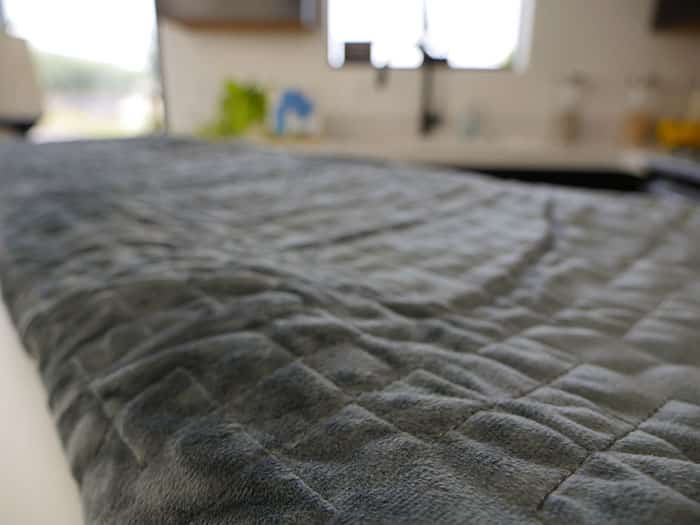
Can you use a duvet insert as a comforter?
Sure, if the tabs don’t bother you and you like white, a duvet insert can be used as a comforter.
But it’s kind of like using a pillow without a pillowcase. Is it possible? Sure. But why? It is best practice to use a duvet insert with a duvet cover and a comforter as a standalone piece.
Is a duvet or a comforter right for you?
I would recommend a duvet if you:
- Like change and want the flexibility to swap out your bedding
- Want to wash your bedding more often
- Struggle with allergies
I would recommend a comforter if you:
- Want a cheaper bedding solution
- Want to avoid the hassle of putting together a duvet
- Have room to clean the comforter in your washer / dryer
FAQs
What is a bedspread?
A bedspread is usually thinner than a comforter and also hangs lower to the ground. Unlike a comforter and duvet which are both pretty fluffy, a bedspread has a denser, quilted feel.
How to wash a duvet?
First, remove the cover and button or zip it closed so it does not turn inside out during washing. Wash the cover on cold. For deep cleaning, you can also wash the duvet insert, but I always recommend washing separately from the cover for the best results.
How to wash a comforter?
To wash a comforter, just toss the entire piece into the washer on cold. For best results, air dry or tumble on low for 15-20 minutes before laying out to complete drying.

